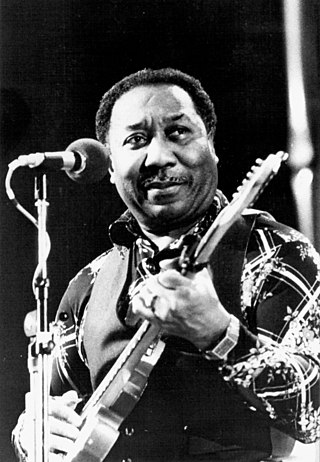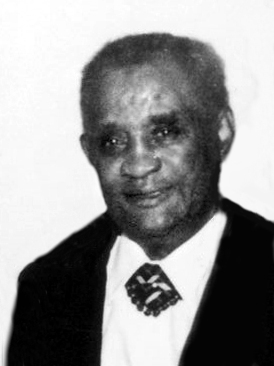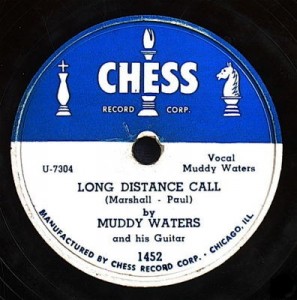Related Research Articles

McKinley Morganfield, known professionally as Muddy Waters, was an American blues singer and musician who was an important figure in the post-World War II blues scene, and is often cited as the "father of modern Chicago blues". His style of playing has been described as "raining down Delta beatitude".

Eurreal Wilford "Little Brother" Montgomery was an American jazz, boogie-woogie and blues pianist and singer.

James Milton Campbell Jr., better known as Little Milton, was an American blues singer and guitarist, best known for his number-one R&B single "We're Gonna Make It". His other hits include "Baby, I Love You", "Who's Cheating Who?", and "Grits Ain't Groceries ".

Adam Gussow is an American blues harmonica player and author, best known as a member of Satan and Adam.

The Mississippi Blues Trail was created by the Mississippi Blues Commission in 2006 to place interpretive markers at the most notable historical sites related to the birth, growth, and influence of the blues throughout the state of Mississippi. Within the state the trail extends from the Gulf Coast north along several highways to Natchez, Vicksburg, Jackson, Leland, Greenwood, Clarksdale, Tunica, Grenada, Oxford, Columbus, and Meridian. The largest concentration of markers is in the Mississippi Delta, but other regions of the state are also commemorated. Several out-of-state markers have also been erected where blues with Mississippi roots has had significance, such as Chicago.

"Hide Away" or "Hideaway" is a blues guitar instrumental that has become "a standard for countless blues and rock musicians performing today". First recorded in 1960 by Freddie King, the song became a hit on the record charts. It has been interpreted and recorded by numerous blues and other musicians and has been recognized by the Rock and Roll Hall of Fame and the Grammy Hall of Fame.
Jim O'Neal is an American blues expert, writer, record producer, and record company executive. He co-founded America's first blues magazine, Living Blues, in Chicago in 1970, and wrote the column "BluEsoterica". O'Neal also co-founded Rooster Blues Records and, as of 2007, operated the Stackhouse record label, with bases in Clarksdale, Mississippi, and Kansas City.
Mississippi Heat is an American blues band based in Chicago, led by harmonica player Pierre Lacocque. Formed in 1991, the band has toured in the United States, Canada, and Europe, with occasional performances in South America and North Africa.

Deitra Farr is an American blues, soul and gospel singer-songwriter.

"Crosscut Saw", or "Cross Cut Saw Blues" as it was first called, is a hokum-style song "that must have belonged to the general repertoire of the Delta blues". Mississippi bluesman Tommy McClennan's recording of the song was released in 1941 and has since been interpreted by many blues artists. "Crosscut Saw" became an early R&B chart hit for Albert King, "who made it one of the necessary pieces of modern blues".

Houston Goff, known as Houston Stackhouse, was an American Delta blues guitarist and singer. He is best known for his association with Robert Nighthawk. He was not especially noted as a guitarist or singer, but Nighthawk showed gratitude to Stackhouse, his guitar teacher, by backing him on a number of recordings in the late 1960s. Apart from a brief tour in Europe, Stackhouse confined his performing to the area around the Mississippi Delta.

"You Don't Love Me" is a rhythm and blues-influenced blues song recorded by American musician Willie Cobbs in 1960. Adapted from Bo Diddley's 1955 song "She's Fine She's Mine", it is Cobbs' best-known song and features a guitar figure and melody that has appealed to musicians in several genres.
Billy Flynn is an American Chicago blues and electric blues guitarist, singer and songwriter.

"Long Distance Call" is a song by American blues musician Muddy Waters. It was first released as a single in 1951 by Chess Records (#1452), with "Too Young To Know" on the B-side. The single reached #8 on the US R&B chart. It was later released on the greatest hits album The Best of Muddy Waters (1958), and is hailed as a classic modern blues song; Waters's singing is cited as an excellent example of blue notes.
Echford Lee Cooper Jr., known as Lee Cooper, was an American blues guitarist. Because of his relatively short career and the anonymous role of session musicians in the 1950s, Cooper is said to be "overlooked and highly underrated." Cooper was an early master of the preferred bold style of Chicago blues guitar, so much so that he became the first successor to Howlin' Wolf's original lead guitarist.

Pierre Lacocque is an acclaimed and internationally renowned American blues harmonica player. His style has been influenced by the post-WWII Chicago blues tradition, and he was inducted into the Chicago Blues Hall of Fame in October 2017.
Mozelle Alderson was an American classic female blues singer. She recorded a small number of tracks for Black Patti Records in 1927 and for Brunswick Records In 1930. Her most regular pianist was Judson Brown. She was a one-time vocalist for the Famous Hokum Boys in 1930 and toured and recorded as a backing vocalist for other blues artists. Alderson used a number of aliases, possibly including Kansas City Kitty, Hannah May, Thelma Holmes, Mae Belle Lee, and Jane Lucas.
Robert "Big Mojo" Elem was an American Chicago blues bass guitarist and singer. Although he recorded only one studio album in his long career, Elem was a part of the Chicago blues scene for over forty years. He variously backed Arthur "Big Boy" Spires, Lester Davenport, Freddie King, Magic Sam, Junior Wells, Shakey Jake Harris, Jimmy Dawkins, Luther Allison, and Otis Rush.
Amelia ("Amy") van Singel was an American blues journalist and radio host. She co-founded Living Blues magazine with her then husband, Jim O'Neal, and was posthumously inducted to the Blues Hall of Fame in 2017.
References
- ↑ "Documenting the Blues". Mississippi Blues Trail. Mississippi Blues Commission. Retrieved May 14, 2015.
- 1 2 Edward Komara (28 October 2005). Encyclopedia of the Blues. Psychology Press. p. 757. ISBN 978-0-415-92699-7 . Retrieved December 10, 2015.
- 1 2 "Living Blues Magazine Reaches 25". The Victoria Advocate. Associated Press. April 9, 1995. Retrieved May 15, 2015– via Google News.
- ↑ David Rothschild (March 17, 1995). "Living Blues Magazine Celebrates 25th Year". Chicago Tribune. Retrieved May 14, 2015.
- ↑ Chris Morris (June 11, 1994). "Mississippi Labels Tap into Wealth of Delta Blues Talent". Billboard. Nielsen Business Media. pp. 1–95. ISSN 0006-2510.
- ↑ Eugene Chadbourne. "David Nelson". Allmusic. Retrieved May 15, 2015.
- ↑ Skelly, Richard. "Biography: Deitra Farr". Allmusic . Retrieved July 13, 2010.